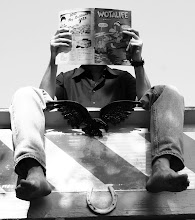
Upon the recent death of Jim Carroll, revisiting his seminal rock-punk classic, 1979’s Catholic Boy, I couldn’t help but recall how funny I used to think that album’s most popular single, People Who’ve Died, was, and, I’m afraid, still is – even after Mr. Carroll’s sad passing.
The 5:07 song is a literal roll call of people in Carroll’s life who reportedly did die, each one seemingly in a more onerous, chilling, Gorey-like manner than the one before – all so bluntly described, the spirit of Raymond Chandler animating Carroll’s cadaverous prose.
It is this deceptively clinical approach to a subject a lesser artist might have softened with the padding of metaphor – or simply approached as a tear-stained ballad – that makes Carroll’s manifesto so powerful, so lasting – and so damn funny.
Teddy sniffing glue he was 12 years old/Fell from the roof on East Two-nine/Cathy was 11 when she pulled the plug/On 26 reds and a bottle of wine/Bobby got leukemia, 14 years old/He looked like 65 when he died
Isn’t that terrifyingly intimate?
So clearly written in deference to the harrowing punches these deaths must have delivered to the poet/singer?
And isn’t that what makes this song so good – so very good it all but becomes a parody of itself, its colorful, Marvel Comics-like parade of names, trumping each other, building the heavenward arc of the song’s emotional architecture?
G-berg and Georgie let their gimmicks go rotten/So they died of hepatitis in upper Manhattan/Sly in Vietnam took a bullet in the head/Bobby OD'd on Drano on the night that he was wed
It’s this tangible itch, one the song never fails to deliver, that made me see the comedic possibilities in transferring it to a skit featuring a high school cheerleading team practicing their interpretation of the song for a charity fund, one founded to honor (what else?) students who have died.
Like my old associates in high school, one who, only a week before graduation, perished in a motorcycle accident that left him all but indistinguishable from a stretch of dark country road just a mile from my house – Johnny Blaze forever now Ghost Rider – the other, eaten from within by cancerous cells.
Jonny took a dive from his bike/Joey caught something his body didn’t like
Despite the presumably unintended gallows humor of the lyrics, it’s Carroll’s mortuary voice that gives his song its universal connectivity – sounding like Lurch reading the contents of his mother’s will.
This is what I would exploit in my high-octane comedy skit, a “guaranteed-hilarious” send-up of small town morality – and mortality.
Each death would receive its own series of mimed motions, Bobby OD’ing with Drano on his wedding night – summed up with a subtle slide of a ring onto a finger, followed by a smooth lift to the mouth with the drain cleaner – and then back into the repeating chorus, where each girl crosses her heart and prays, before falling backwards, dead as a cartoon, mimicking crosses on her eyes, right into the arms of the girl positioned behind.
Of course, all of this has to be performed with the sincerity of Soupy Sales tending a custard pie – to break from such would ruin it.
Add to this a lovingly out-of-tune head cheerleader – Olive Oyl at the opera – an overly-enthusiastic, effeminate male coach – Richard Simmons playing Richard Simmons – and a plethora of poms-pons – and you’ve got comedy platinum.
I kid you not.
Mary took a dry dive from a hotel room/Bobby hung himself from a cell in the tombs/Judy jumped in front of a subway train/Eddie got slit in the jugular vein
Jim Dennis Carroll.
What a funny fucker.
Born to spew lavender – all the anger and mistrust a world has to offer – with all the mannered pomposity of Bob Newhart – playing God – picking through the dead, describing the depths of a Catholic Hell.























